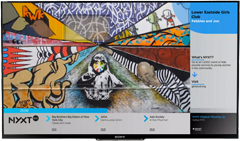Amnesty International USA Calls for Ban on the Use of Facial Recognition Technology for Mass Surveillance. Looking to better understand the threat that facial recognition poses for human rights, we interviewed Michael Kleinman, Director of the Silicon Valley Initiative at Amnesty International USA. We talked about the importance of the campaign, what short-term goals Amnesty is hoping to achieve from it, and which organizations they are working with to make it a success.
The campaign will expand outside of the U.S. later in 2021, to look at New Delhi, Ulaanbaatar and other areas where the use of this facial recognition technology has been particularly egregious. For more Amnesty International videos, click here.
What is the "Ban the Scan" campaign about?
The “Ban the Scan” campaign is a global campaign to ban police use of facial recognition systems, a form of indiscriminate mass surveillance that undermines our right to privacy, amplifies racist policing and threatens the right to protest. The campaign kicks off with New York City and will then expand to focus on the use of facial recognition in other parts of the world in 2021.
What data and information can you share about facial recognition?
Police use of facial recognition poses a risk to everyone – the fact that your face can be captured and tagged in a police database simply by walking down the street poses a grave threat to our right to privacy. Further, facial recognition technology exacerbates systemic racism as it disproportionately impacts people of color, who are already subject to over-policing and other forms of discrimination. Black people are also most at risk of being misidentified by facial recognition systems.
We saw these violations of human rights in action over the summer during the peaceful protests for Black lives. In New York City, the NYPD seemingly used facial recognition to identify, track down Black Lives Matter protester Derrick Ingram, and show up at his apartment in riot gear without a search warrant and accused him of assaulting a police officer during a protest. The NYPD initially confirmed that facial recognition technology was used, and New York City Mayor De Blasio vowed to revisit the NYPD’s use of the technology. While the NYPD initially confirmed it had used facial recognition technology, it has yet to adequately disclose documentation in Derrick’s legal case on the use of facial recognition technology.
Is Amnesty International collaborating with other organizations or professionals for this campaign?
The New York City chapter of this campaign is conducted in partnership with AI for the People, the Surveillance Technologies Oversight Project, the Immigrant Defense Project, Legal Aid Society, National Action Network, the New York Civil Liberties Union, the Electronic Frontier Foundation, Rada Studios, Warriors in the Garden and the New York City Public Advocate's office.
What are some short-term goals of the campaign?
The most immediate goal is campaigning for the New York City Council to pass legislation to ban the use of facial recognition technology for mass surveillance by the New York Police Department. Amnesty International is also calling for a total ban on the use, development, production, and sale, of facial recognition technology for mass surveillance purposes by the police and other government agencies and calling for a ban on exports of the technology systems.
Are there other campaigns right now or new ones coming up that you would like to highlight?
The campaign will expand outside of the U.S. later in 2021, to look at New Delhi, Ulaanbaatar and other areas where the use of this facial recognition technology has been particularly egregious.
Subscribe to the NYXT newsletter
Learn about upcoming events, volunteer opportunities, and new organizations looking for your help.


